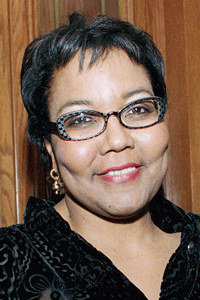Julieanna Richardson is the woman behind HistoryMakers, a Chicago based non-profit organization that houses an archival collection comprised of over 3,000 interviews, featuring African-Americans across various industries. She has quickly become an arduous force in maintaining records of prominent black innovators and trailblazers in American history with the creation of HistoryMakers.
The Harvard Law School alum is responsible for the documentation of the unknown, the forgotten and the misrepresented African-Americans who can now have their stories preserved for future reference.
Richardson’s passion for recording the most accomplished African-Americans began with questions she had as a young girl growing up in a small Ohio town. In the ninth grade, a teacher asked the class about their family background. This seemingly harmless question sparked feelings of shame and inadequacy.
“Identity is very important. If you don’t have it, there’s a sense of your roots being lost,” she pointed out. “I was embarrassed until recently. I was embarrassed about my enslaved heritage but I have a totally different view now.”
Instead of being defeated by this moment, she became curious.
The search to know more about the stories of people from the past who influenced the present brought a sense of urgency when she was an undergraduate student at Brandeis University.
“I would say going to a school like Brandeis, which is a Jewish university. I wanted what they had. They had pride in their history,” Richardson said.
Richardson first began interviewing the likes of Butterfly McQueen who appeared in Gone With the Wind; the historian John Henrik Clarke; and Honi Coles, the famous tap dancer. Although she garnered support from celebrities like Harry Belafonte, Ruby Dee, Dionne Warwick, Diahann Carroll and Angela Davis to jumpstart HistoryMakers in its infancy, the biggest challenge for the organization has always been fundraising. Despite the challenge to raise money, HistoryMakers has fast become a valuable source for various institutions.
The HistoryMakers website has been the go-to website for individuals and well-known institutions. Well cited within Wikipedia, users have spanned the globe from the BBC to the University of Dublin where a student conducted research on police brutality. The value of having HistoryMakers as a resource to gain access to black history is vital, considering the way people consume information in the current digital age.
“Gone are the days where kids in the 1930s would listen to the fireside chats and their imagination would take them places. You have to have a visual to go along with the story for the story to come alive,” she said.
HistoryMakers offering the visual experience has extended to the “Evening With” series. This program serves as a reminder to the African-American community and the general public of the progress black people have made.
One such trailblazer featured on the Evening With program who discusses his life and career path is Kenneth Chenault, the former CEO of American Express. He discussed the obstacles he faced while guiding the company through many crises, such as the 9/11 attacks, the 2008 financial collapse and losing Costco as a client.
Chenault’s leadership skills and his tenacity makes him worthy of acknowledgement, especially as an African-American man in corporate America who has risen to the top through hard work and a natural charisma that very few possess.
“He is incredibly gifted at business,” Richardson emphasizes. “You don’t stay that long and have that good of a reputation. There are so many things that can take a CEO down. The average stay is five to ten years. He was there for seventeen.”
BusinessMakers is an important segment of HistoryMakers because of the negative perception of African-Americans in business, which leans toward the prevailing thought that African-Americans are irrelevant where it concerns dynamic business innovation and influence.
“We have to change the perception that we just arrived at the table. We’ve been here,” she said.
With the unrelenting focus, success and output of HistoryMakers, there is always the looming question of the true intent behind this massive undertaking. Of course, there was a personal obligation on Richardson’s behalf and a sense of responsibility initially felt, which all stemmed from a single childhood moment.
“I don’t want any child, ever, to feel the way I felt in that classroom,” she said. “If the records informs generations and shows the depth and extent of our contributions to society then I would’ve done good. It will all be worth it.”
